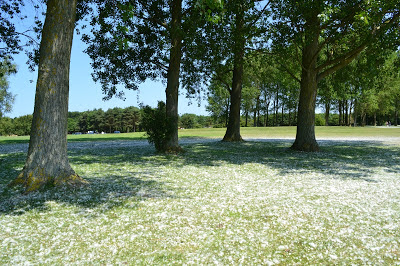The visitor centre does have a nice little display on local archaeology, including an Anglo Saxon skeleton discovered during its construction, and does have some printed material on the shrine discovery, but has nothing at all from the excavation. In fact, the idea that they should seemed rather a surprise to the staff member on duty. Curioser and curioser...
Despite not seeing any of the actual finds (which I confess I was disappointed about), I did find out a little more about the site - namely that despite the recent press coverage, it was actually excavated way back in 2008. The male skeleton, of which much play was made by the media and which I suggested would be extremely interesting if Roman in origin, is actually Anglo Saxon, dating to the 5th or 6th Centuries. The Historic Environment Record entry for the site can be viewed here.
I was able to find out a little more about the finds from the site though, such as the fact that an interesting little curse tablet was discovered, and that the bronze figurine fragment that was vaguely referenced in the media (but which I wrote would be key to identifying the deity being worshiped) turns out to be part of a Corinthian helmet, making it likely that Minerva, or possibly Mars, was the presiding deity.
The trip was far from wasted though, as a little stroll along the banks of Rutland Water in the sunshine is hardly a chore.













The display cabinet shown in your second photograph contains four vessels all from the excavated shrine. Although there does appear to be an absence of labelling.
ReplyDeleteAndy Chapman
Senior Archaeologist
Northamptonshire Archaeology
achapman@northamptonshire.gov.uk